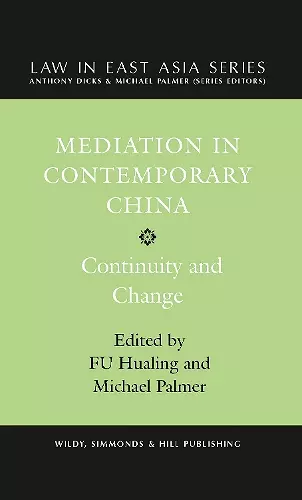Mediation in Contemporary China: Continuity and Change
Michael Palmer editor Fu Hualing editor
Format:Hardback
Publisher:Wildy, Simmonds and Hill Publishing
Published:28th Mar '17
Should be back in stock very soon

This collection of essays is the result of a collaborative project between Professors Fu Hualing and Michael Palmer, along with scholars in both Hong Kong and mainland China, on the nature and place of mediation in the justice system of the People's Republic of China. The project explores key aspects of the continuing central importance of mediation as a dispute resolution process, the various efforts at the refurbishment of mediation that have been made over the past decade or so, and the reforms that would best enhance the practice, theory and teaching of mediation. Mediation is used in China today for handling disputes in a variety of institutional contexts: ‘people’s mediation’, which is primarily a form of local community dispute resolution, judicial mediation carried out by judges in and around the court, administrative mediation as conducted by officials and often focused on specific areas of governmental responsibility (as, for example, is the case with environment disputes), mediation in arbitral proceedings, and private mediation carried out without specific institutional support. Over the past fifteen years or so, in response to the rapid economic and social changes taking place in mainland China (including, inter alia, a declining importance of the local community) there have been attempts to institutionalize mediation, to resource it better, and to give it more legitimacy and legal force. In handling cases that come before the courts, judicial mediation continues to be seen as a particularly useful process, offering flexibility and effectiveness in dispute resolution (and even in handling serious criminal cases). But at the same time, the widespread reliance on mediation can also mean that dispute negotiations do not take place in the 'shadow of the court' but, rather, in the 'shadow of mediation'. Under the current Xi Jinping government, the Chinese Communist Party’s concern with political stability and social harmony has intensified. Even more so now than in the past, China's judges, people’s mediators, arbitrators and others have to consider the social and political impact of their dispute resolution work, and to see mediation as a part of a larger scheme of dispute containment.
ISBN: 9780854902248
Dimensions: unknown
Weight: 742g
420 pages